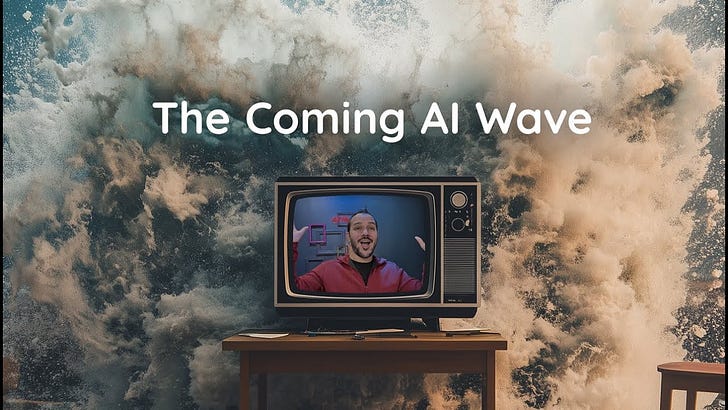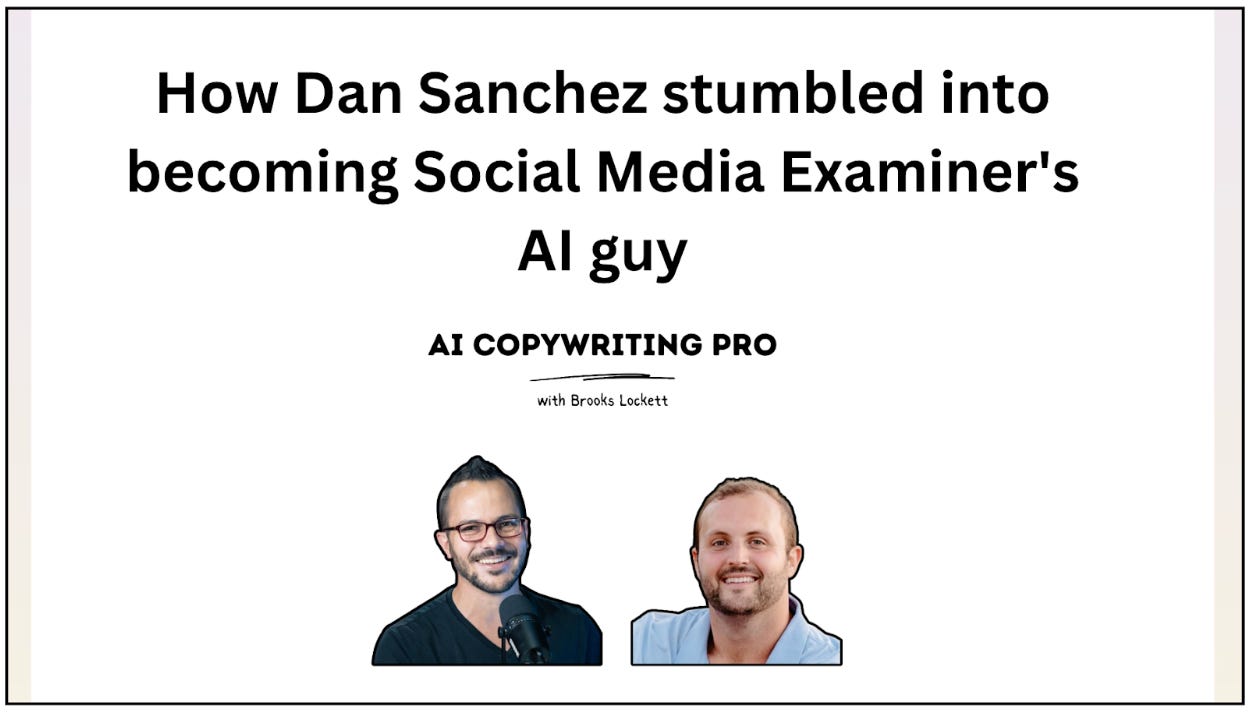The following is a conversation with Dan Sanchez. He recently joined Social Media Examiner as their AI educator and content creator and is also an AI Marketing Consultant. I caught up with Dan to talk about AI + content + why most marketers are still way earlier in their AI journey than they think.
You just landed this fascinating role at Social Media Examiner. How'd that come together?
Mike Stelzner and I had actually connected before this - we'd done an interview for his show and grabbed lunch. But what was wild was how this role came about. He basically hit me up like "Hey, I don't even know how this is gonna work, I haven't talked to my team about it, but I want you on board." Never had someone approach a job offer quite like that.
Funny thing is, they were initially hiring for a social media manager. I had to push back - told them straight up "You don't want a manager, you want a creator." There's a massive difference between someone who manages social and someone who builds stuff that gets attention online.
What's the actual role looking like?
It's basically two parts. I'm coming in as a creator to develop these unique show concepts, especially around their conference. But I'm also diving deep into AI because Mike is going all-in on that direction. Like, half of Social Media Marketing World is now AI-focused - they've even got a dedicated AI ticket track.
Lucky for me, since I'm a marketer's marketer, I get what resonates with this audience. Marketers love creative stuff, they love novel things. And when you throw in a right hook (like trying to sell them something) they actually respect it if you do it well.
I could've kept going solo but the market for pure AI work is still developing. I was still doing a lot of marketing automation and podcasting work just to pay the bills. Getting to focus on this full-time is exactly where I want to be.
What surprised you about how marketers are actually responding to all this?
What's wild is I didn't realize how early we still are until I started talking to my marketing peers, especially in tech. You'd think people working in SaaS would be the early adopters, right? But even last spring, most of my tech marketing peers hadn't even started paying for ChatGPT Plus yet.
That's kind of a tell. If you're not willing to throw down 20 bucks a month, you're probably not using it seriously yet. Like, that subscription is basically your signal that you're starting to integrate it into your workflow.
What are you seeing in terms of how marketing teams are thinking about AI?
I've got some really smart peers who still think AI is just gonna be this little subsection of martech and ops. Maybe its own cute little division at best. But I'm looking at this completely differently.
I think it's going to fundamentally change every single vertical within marketing. Everything's going to look different - even leadership roles will be AI-enhanced. What used to be entry-level positions will become AI team management roles. The whole hierarchy is gonna shift if you ask me.
Sounds like you're seeing a pretty massive transformation coming.
Yeah, I had this writing-on-the-wall moment last year. I started my own AI podcast because I just needed to tell people everywhere "Hey, AI is going to be a big deal. Like a really big deal."
It reminded me of being online before social media blew up, or before WordPress took over. I remember knowing WordPress was gonna be the thing that controls everything - it was just clearly the best solution out there. Now it powers like 45% of websites on the internet.
But I didn't document that journey. This time with AI, I am going to capture it all.
We haven't even hit that early majority part of the adoption curve yet. But I bet we cross that chasm in 2025 - that's when most of the population starts using AI regularly. That's the inflection point I'm watching for.
I've watched your YouTube content, and you're tackling some complex stuff - like explaining prompt engineering over video. That seems tricky to pull off.
[Laughs] Okay, so this is kind of embarrassing, but I picked video partly because I slept through English class in high school. Massive mistake. Every teacher swears their class is the most important, right? But English actually was - writing ended up being way more crucial than any other subject.
I do okay writing now, but as an introvert, getting in front of the camera was actually pretty intimidating at first. I remember recording my first video - it's still up on YouTube somewhere - and the amount of retakes was just brutal. But it's like anything else, you just get better with practice.
What made you stick with it?
My brother introduced me to Casey Neistat back in 2015-2016, and I started watching his daily vlogs religiously. It really opened my eyes to how powerful that daily face-to-face connection can be. Like, when people watch you regularly on video, they feel like they know you. I get on calls now and people are like "I feel like I know you".
Plus now with AI, you can turn those video transcripts into all sorts of other content. It might not be A+ writing, but if you know how to prompt well you can get pretty damn close.
Seems like teaching these concepts has helped you master them too.
Oh man, 100%. I actually developed this process I call the 30-30-30 plan for mastering any niche topic.
Find a topic that has 30 books or less on it. The first three books will have tons of info, but after that, you're mostly just skimming for new stuff. So reading 30 feels more like reading 10. Anyone can do that in a year.
Then interview 30 people on the topic. You'll discover stuff you didn't even know you knew just by having these conversations. Finally, create 30 unique pieces of content teaching it.
That process of having to break something down for beginners is what really forces you to master it. You start finding gaps that haven't been talked about before, and suddenly you're the one who has to figure out how to make it simple for others to understand.
Do you think video is just inherently better for this kind of teaching?
Nah, the medium honestly matters less than the teaching itself. Master writers can get in your head in a way that even movies can't - I love reading fiction for exactly that reason. But for me, video just clicked. And we're in this video age now where it's easier to convert video into other formats than the other way around.
Tell me about your consulting work - what kinds of projects are marketers actually coming to you with?
So for the past year and a half, I've been this weird hybrid consultant-freelancer, depending on what people needed. Started out as this mix of podcasting and marketing automation stuff, but then as I got deeper into AI, that naturally became part of the package.
At first, I just started sneaking AI into the other things I was doing. Like, I'd help someone launch a podcast and be like "Oh by the way, you don't need to pay someone to write your show notes anymore - AI is actually really good at that. Let me show you how." Then I'd build them this whole production line where they're using AI to generate titles, summarize episodes, all that stuff.
How'd that evolve over time?
It got really interesting when I started applying AI to marketing automation. Traditional automation is basically just injecting fields based on dropdown menus. Super limited.
But with AI I started doing things like personalizing every single email lesson based on someone's role, who they sell to, their position in the company. Stuff that was literally impossible before. Even in my own AI course, every lesson is unique based on all these different factors about the student.
Any particularly wild success stories?
Yeah, this one's pretty crazy. I worked with this marketing consultant who helps companies prepare for the future - kind of a futurist type. He had this incredibly detailed method for mapping out different future scenarios and spotting risks and opportunities. Problem was, it took him two weeks to work through the model with each client.
So we built this custom GPT that could do the same thing in 30 minutes. Think about that - we took something that used to take 80 hours and compressed it down to half an hour. Now he can literally do it live on client calls.
Do you think most companies get how to use these tools effectively?
Not even close. Most people are either way too cautious or they're trying to use AI for everything without really thinking it through. The sweet spot is understanding exactly where it fits in your workflow - knowing when to bring it in and when to keep it out.
When you look at AI's impact on marketing over the next few years, what's your take?
Yeah there's a lot of theoretical stuff floating around about AI doom and gloom and these wild utopian futures. I don't touch any of that.
I'm focused on how we can use AI right now to crush it as marketers? Not five years from now - like, what can we do today and in the next few months to get better results?
What's your framework for thinking about it?
I break it down into three buckets: faster, better, and smarter.
Most people should start with faster - just figuring out how to do what you're already doing more efficiently. That's your entry point.
Then you level up to better. I'll be real with you - I'm probably a C+ writer naturally. But AI elevates me to B+ because I can have it make things more concise and clearer. I'll write a LinkedIn post, run it through ChatGPT or Claude, and boom - it's better than my final draft would've been. And yeah, that kind of hurts my ego, but I'm not romantic about the craft. If it's more effective, let's do it.
And the "smarter" piece?
Once you're comfortable with faster and better, you start seeing opportunities that literally didn't exist before. AI becomes like this coach and consultant if you know how to ask the right questions.
There's all this new stuff possible now that you couldn't even dream of three years ago. I'm talking about innovations in how we serve customers, reach people, create content - complete paradigm shifts. But you gotta walk through that progression. Do things faster, do them better, then you'll start seeing those "holy shit" moments where entirely new possibilities open up.





